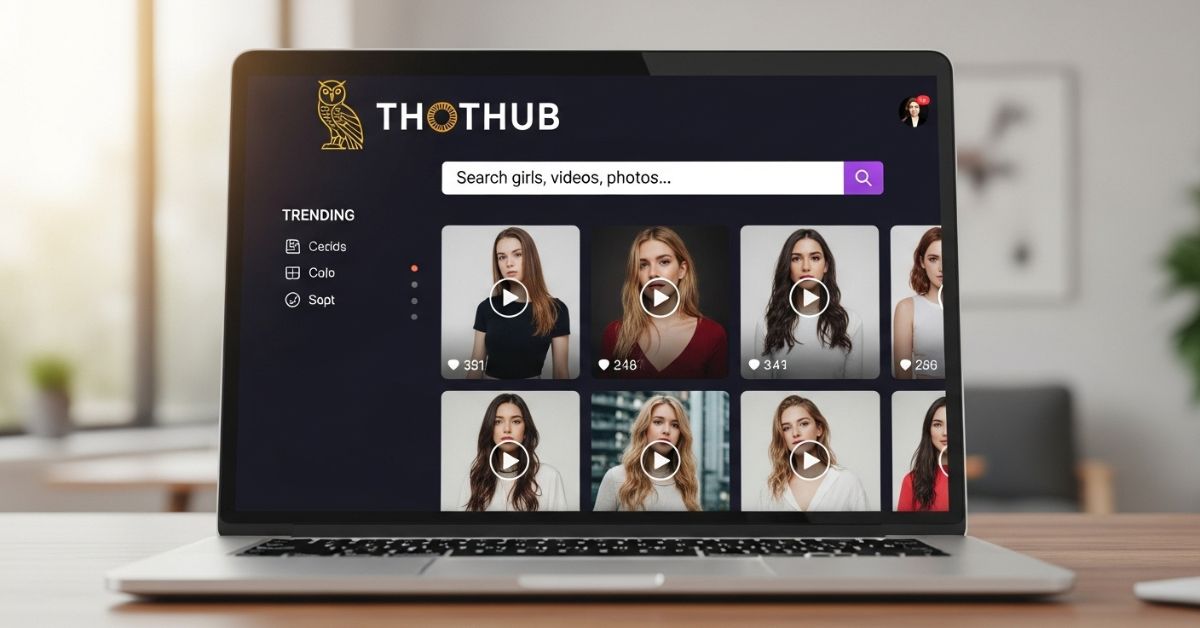Contents
Introduction
The internet is full of platforms that rise fast and disappear even faster. Some leave a positive mark, while others become cautionary tales. One such name that caught global attention was Thothub — a website that went from being a popular online hub to one of the most controversial platforms of its time.
Thothub’s story isn’t just about a website; it’s about privacy, consent, and accountability in the digital world. This article explains the truth behind Thothub and the real reasons why it was taken down.
What Was Thothub?
Thothub began as an online community where users could upload and share content. It looked like a typical media-sharing forum at first glance — simple layout, user accounts, and categories for different types of uploads.
But soon, it became clear that Thothub wasn’t operating like a normal platform. Many of the uploads were private and copyrighted materials, shared without permission. People started to notice that personal photos and videos — meant to be seen only by paying subscribers or private audiences — were appearing on Thothub for free.
This made the site grow in popularity quickly, but it also planted the seeds for its downfall.
The Rapid Rise in Popularity
In its early days, Thothub became a favorite among internet users because it offered what appeared to be “exclusive” content for free. The website’s open structure allowed anyone to post, which made it grow rapidly through word of mouth and online mentions.
It didn’t take long for Thothub to become one of the most visited sites in its category. Thousands of new visitors came daily, and uploads multiplied.
However, behind this growth was a serious problem — most of the content didn’t belong to the people uploading it. Creators began noticing their private materials being shared without consent, and what followed was a wave of outrage and legal action.
The Beginning of the Controversy
The trouble really started when creators and rights holders began to speak out. Many of them were content creators who used subscription-based platforms to share their work legally with paying fans.
When they discovered their private material on Thothub, they reported it — but the site’s administrators did little to take it down. Some reports were ignored completely.
This lack of action turned what could have been a small issue into a massive problem. It became clear that Thothub was knowingly hosting stolen content. The situation quickly escalated from online complaints to full-scale legal attention.
The Legal Side of the Story
By early 2020, law enforcement and digital rights organizations began investigating Thothub. The evidence showed that the website violated several copyright and privacy laws by allowing unauthorized content to stay on its servers.
In many countries, distributing or even hosting copyrighted material without permission is illegal. Moreover, sharing someone’s private or intimate content without their consent is a serious privacy crime.
Authorities found that Thothub was not only allowing this kind of content but also profiting from it through ads and traffic. That made the case even stronger against them.
Why Thothub Was Taken Down
The final blow came when hosting providers and internet watchdogs stepped in. The site had received too many reports and legal notices to continue operating.
Here’s what led to its shutdown:
- Copyright Violations: A large portion of the content on Thothub belonged to creators who had not given permission for it to be shared.
- Privacy Breaches: Private material was being posted without consent, violating digital privacy laws.
- Ignored Reports: The administrators failed to remove illegal uploads even after multiple complaints.
- Legal Pressure: Investigations and lawsuits forced the hosting companies to cut ties with the website.
By mid-2020, Thothub was completely shut down. The domain was taken offline, and its backups were seized as part of an ongoing investigation.
The Aftermath of the Shutdown
When Thothub disappeared, reactions were mixed. Many creators and privacy advocates celebrated the takedown as a major victory for online safety. For them, it was proof that justice can exist in the digital world.
However, some users tried to create copies of Thothub on new domains. These clone sites didn’t last long, as authorities quickly began monitoring for illegal uploads.
The shutdown also sparked wider conversations about the importance of ethical content sharing. People started to understand that the internet isn’t a free-for-all — consent and respect matter just as much online as they do offline.
The Human Impact
Behind every upload and click were real people. The victims of Thothub’s leaks weren’t just anonymous profiles; they were creators, professionals, and everyday individuals whose personal boundaries were violated.
Many of them faced emotional distress, online harassment, and financial loss. Some even had to rebuild their online reputations from scratch.
This part of the story is often overlooked, but it’s crucial. Thothub wasn’t just a legal failure — it was a human one. It showed how deeply damaging digital exploitation can be.
Lessons We Can Learn
The Thothub case taught the internet several valuable lessons about privacy, responsibility, and ethics.
- 1. Consent Is Non-Negotiable: Sharing someone’s content without their approval is never okay.
- 2. Platforms Must Be Responsible: Websites need strict moderation and quick response systems for takedown requests.
- 3. Users Have Power: Reporting illegal or unethical activity helps maintain safer online spaces.
- 4. Privacy Education Matters: People should learn how to protect their data, use secure platforms, and manage their digital identity carefully.
These lessons apply not just to creators, but to everyone using the internet.
The Broader Impact on Online Culture
Thothub’s downfall became a turning point in digital history. It made people realize that privacy breaches and digital piracy are not just small online issues — they can have real-world consequences.
After the scandal, many major platforms strengthened their terms of service and reporting systems. Governments in several countries began pushing for clearer online safety laws. Even content-sharing platforms like OnlyFans started improving their security measures to protect creators.
Thothub’s end became a warning sign for every similar site that tried to profit from stolen or private content.
Conclusion
The truth about Thothub is simple: it was a website that grew fast because it ignored basic principles of privacy and consent. For a while, it thrived on other people’s content, but in the end, it couldn’t survive the legal and ethical backlash.
Its shutdown was not just about enforcing laws — it was about restoring fairness and respect in the digital world.
Thothub’s story is a reminder that the internet is not above accountability. Every upload, share, or click carries responsibility. The fall of Thothub marks an important step toward a safer, more respectful online community — one where creators are valued, privacy is protected, and ethics come before profit.


